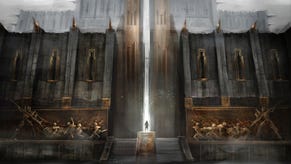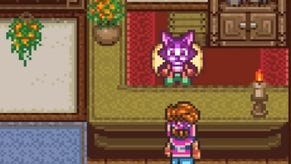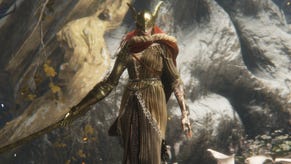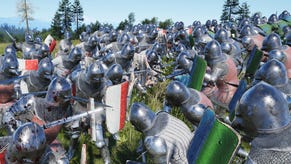Torment: Tides of Numenera dev issues apology for missed stretch goals
"We should have communicated the cuts earlier."
Torment: Tides of Numenera developer inXile has issued an apology, following the discovery that certain stretch goals promised in the game's then-record-breaking 2013 crowdfunding campaign have not materialised.
The discovery was made using leaked Achievements from the final game, due 28th February on PC, PS4 and Xbox One. The most notable omissions include missing companions - I'll discuss those in detail further down, underneath a statement inXile has sent me, so I can keep any potential spoilers out of the way - and no Italian language support. If you are an Italian backer and this is a deal-breaker you can now claim a refund.
But the most glaring issue is not the missing content - which some inXile staff members have tried to explain on the company's forum and on Reddit - but that backers, people who funded the game, are only now finding out, off the back of their own detective work no less. Why didn't inXile say something before?
Torment: Tides of Numenera creative lead Colin McComb replied.
"We did have to cut some content, and had to make some difficult decisions based on lengthy internal prototyping, budgeting, and scheduling considerations," he told me. "Some of our initial ideas didn't pan out as we had hoped, and some of them would have cost us content that we felt was more important for the overall experience of the game. Game development is never a straight line, and it's extraordinarily rare for a project to go unchanged from vision to completion.
"We should have communicated the cuts earlier," he added, "when they happened. Unfortunately, because we were busy finishing and polishing the game, we neglected to reach out to our community and explain the changes that were necessary. Please know that we absolutely and sincerely apologise to our backers for that lack of communication.
"We're extraordinarily grateful to all our backers who made it possible for us to get this far. We are currently considering ways to integrate ideas that didn't make it into the initial launch, and we promise that any potential future expansions or content will be made available for free to all backers."
The emphasis above is mine - I didn't want you to miss that point. Potential spoilers follow.
Specifically, Achievements note six companions, but the Kickstarter campaign still clearly shows stretch goals promising at least eight, maybe nine. There were new companions promised at the $2m, $2.5m, $3m and $3.5m markers, and the $3m milestone noted there were seven total companions at that point. But in the final game there only appear to be six.
It's hard to know which companions were cut, as two of them were a secret, but it looks like Toy, a living ball of goo that changes appearance based on its master's desires, won't make it either, which is a shame.
"The companion roster has been slightly reduced from our initial plans," wrote inXile staffer "sear" on Reddit.
"During development, we found that the more far reaching and reactive our companions were, the better they felt and the more justice it did to the original Planescape: Torment. This trade-off meant we were able to add more companion conversations, banter, voice-over, quests, and story endings. We did not want to leave some companions feeling shallow, with storylines that felt incomplete, or be forced to shove them into the late game.
"That said," sear added, "we certainly haven't shut the door on Torment's development. We still have a lot of early work done on other companions and are open to continuing to work on the game. We can say that any DLCs or expansions that we put out will always be free to our backers of that game, so there is no need to worry about paying for any additional content in Torment."
The stretch goal announcing the Oasis as a second city hub also appears to have been missed, although Colin McComb (and sear, separately) explained that was because the Bloom, the living city that straddles dimensions, had grown to become that second city hub instead.
"During the game's development, there were some unexpected elements of the game that, for the sake of the storyline and gameplay, grew in size and scope," McComb said. "The game has over 1.2m words, and features many of the stretch goals we detailed earlier on - the Ascension, the expanded Bloom that turned into our second city hub, cults like the Dendra O'hur and Children of the Endless Gate."
Sear added: "Despite being one of the earliest locations we showed, the Bloom was originally intended to be smaller than it ended up being. Though we initially planned for the Oasis to be our second major story hub, over time our fascination with the Bloom's darker, more Tormenty feel, led to it being recast as the game's second major city hub instead. We felt creatively this was the right thing to do, and the change did not shorten the gameplay experience."
The other major omission is the crafting of numenera, the game's magical, mysterious, equippable, objects.
Sear tackled this on the inXile forum: "The main one that I haven't seen mentioned, but should address, is crafting. During development, it became very clear that a traditional crafting system wasn't meshing. We had some early design done, but everything ended up feeling like an MMO-style system, and that just didn't fit Torment's gameplay.
"Instead," sear said, "we repurposed those resources, adding significantly more and better Cyphers and Artifacts to the game. We also added some elements that are thematically in line with crafting, like surgical procedures, companion armor upgrades, and essences."
Torment: Tides of Numenera is a spiritual successor to Planescape: Torment, one of the most revered computer role-playing games of all time. It plumbed philosophical depths other games did not, and was unusual in a way other games weren't. Torment: Tides of Numenera is exactly the same in that regard, but differs in that unlike Planescape it is not based in a Dungeons & Dragons setting but in the new setting of Numenera instead.

















